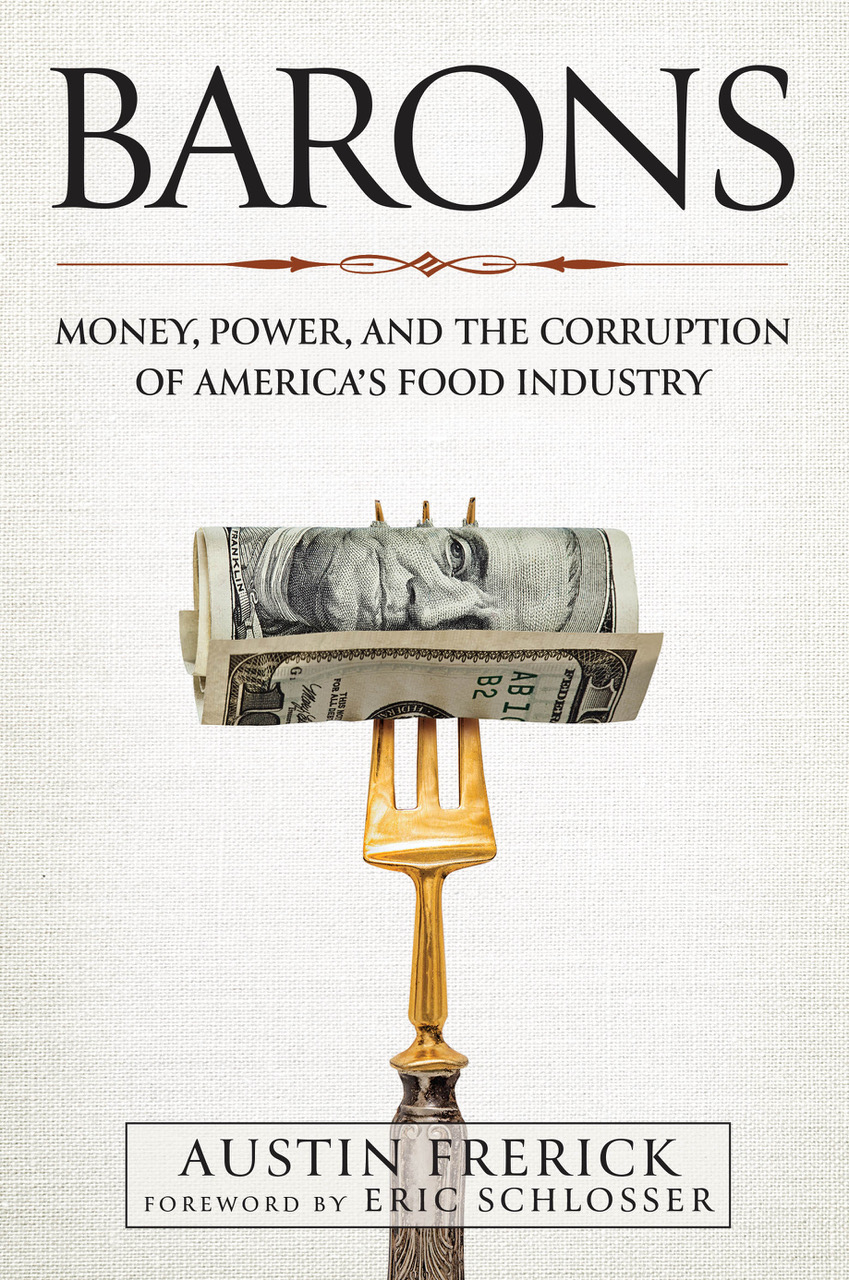[blog-archive-images]
Austin Frerick was never able to confirm the rumour that Jeff and Deb Hansen had “When Pigs Fly” emblazoned on their private jet. But he does a good job at explaining how the power couple from Iowa and their enterprise, Iowa Select Farms, became the 4th biggest pig producer in the US and the toll that has taken on the health and wellbeing of local people and the environment. And adult pig produces about 10 times as much feces as a human and in Iowa hogs outnumber people eight to one. It’s not just the often unbearable stench of manure but the impact on water quality too: to provide Iowans with safe drinking water, the Des Moines Water Works spend up to $10,000 per day to remove nitrates. Why is this more than just a rather sad regional story? Because in his book Frerick shows that financial contributions to political campaigns and getting the ‘right kind of people’ elected is a tried and tested method for the success of the food barons’ continued success, not just in the US, but globally: burdensome environmental regulations disappear, troublesome labour laws never see the light of day.
By portraying seven family owned or majority family owned enterprises Frerick analyses what it took to get to a dominant position and how it impacts rural communities, workers, the environment and what we all eat.
Take the grain baron Cargill, today “the largest private company in America” which “handles more than one-quarter of the world’s grain trade”. Vertical integration is key: Cargill controls not just storage but also insurance and transport, including building and running its own shipping fleet. “Cargill entrenched itself as the dominant middleman in the grain trade and then used this position to amass economic and political power through an aggressive acquisition strategy”. The company expanded into beef production and slaughter, runs refineries to produce ethanol and high fructose corn syrup (HFCS), the latter can be found in most ultra-processed food items. Or as Frerick puts it: “Because of this dominance I think of Cargill as the twenty-first century’s version of Standard Oil. But given Cargill’s size, power, and geographic scope, that comparison might undersell it. A better analogy might actually be the British Empire in the nineteenth century. After all, the sun never sets on Cargill grain”.
The “Berry Baron” Driscoll’s sells berries worldwide under the Driscoll brand – but the company doesn’t grow any itself. “Driscoll’s owns the patents to the berry’s genetics, which it licenses to approved growers on an exclusive basis”. The risk lies with the growers, and Frericks cites a Guardian investigation that discovered European suppliers paying workers less than minimum wages while exceeding legal limits for working hours. Driscoll’s “recently purchased berry companies in the United Kingdom and one that operates in sub-Saharan Africa”.
One UK supermarket that will definitely stock Driscoll’s berries is ASDA which is no longer owned by Walmart outright, but the US retailer still holds shares and has a seat on the board. In ‘The Grocery Barons’ Frerick describes how a company of this size can “tell its suppliers the price it wants and lets them figure out what corners to cut to get there”. And that has consequences for what we eat: in a price war, fresh fruit and vegetables can’t compete with ultra-processed foods.
Few people, me included, have heard of the Luxemburg based JAB Holding Company which owns coffee chains and bakeries across the globe. The German Reimann family is behind JAB Holding, and the story Frerick tells about their rise to power is truly horrific, in particular when, like me, you grew up in Germany. Originally a chemical company, the Reimanns were early Hitler supporters and ardent anti-Semites. Frerick describes their use of forced labour and the despicable treatment the workers suffered. The details became public only in 2018 and JAB donated millions to help former forced labourers and to projects to honour the victims of the Holocaust and Nazi terror. “The family’s contrition appears to be genuine”, writes Frerick. But while most Western companies stopped doing business in Russia after the invasion of Ukraine, “as of August 2023, JDE Peet’s, one of JAB’s core portfolio companies, still operated in Russia”.
JAB sells coffee under a whole host of brands, it owns Keurig, Dr Pepper Inc., and among its coffee and bakery chains are Pret A Manger and Krispy Kreme. “The company now sells more coffee than Starbucks”.
The title of Frerick’s book: ‘Barons – Money, Power, and the Corruption of America’s Food Industry’ is slightly misleading. The impact of these companies can be felt globally and makes the book essential reading in the UK, too. Once you are done you’ll hopefully go in search of farmers’ markets, farm shops, veg box suppliers, independent bakers and butchers to buy from, in person or online.
Austin Frerick
Barons – Money, Power, and the Corruption of America’s Food Industry.
Island Press, £21,99
Marianne Landzettel is a journalist writing and blogging about food, farming and agricultural policies in the UK, the US, continental Europe and South Asia. She worked for the BBC World Service and German Public Radio for close to 30 years.Follow her on X at @M_Landzettel and m.landzettel on Instagram
The Slow Food blog welcomes contributions on the topics of Food, Farming and Agriculture. The contents may not entirely match the views of Slow Food, but reflect the journeys of the authors. To write for us please click here




